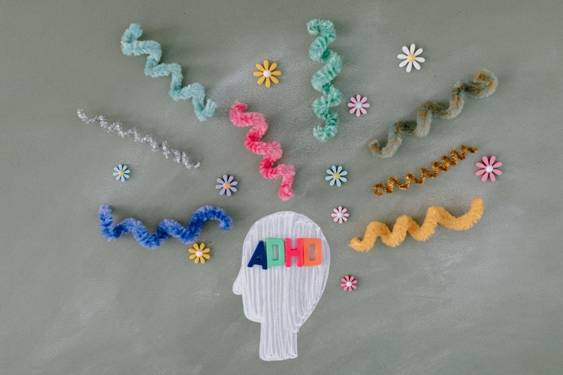Exploring The Link Between Echolalia And ADHD | Causes, Treatment & More

Attention Deficit Hyperactivity Disorder, better known as ADHD, is a neurodevelopmental disorder that can affect children and adults alike. Living with ADHD can present challenges in almost every aspect of your life. While ADHD is one disorder, many conditions can co-occur with the disorder.
One such condition is Echolalia, a speech condition that is mostly present in people living with neurodevelopmental disorders such as ADHD and ASD (Autism Spectrum Disorder). Echolalia refers to a condition where one repeats or echoes words or phrases spoken by others.
While echolalia is a part of normal language development until the age of 3, if this condition persists beyond the age of 3, then it can be something of a concern. In this blog, I’ve highlighted the link between echolalia and ADHD and how you can treat echolalia with ADHD.
Understanding ADHD

Before we get into exploring the link between echolalia and ADHD, here’s a brief overview of ADHD. Attention deficit hyperactivity disorder is a condition that can be characterized by persistent patterns and symptoms of inattention, hyperactivity, and impulsivity. These three core symptoms of ADHD are commonly associated with childhood, but adults can still experience them well into their adulthood. The only difference is that these symptoms may occur in different manifestations.
What is Echolalia?
Echolalia is a phenomenon where a child (in most cases) repeats words, phrases, and sounds often spoken by other people, either immediately or later. Echolalia is very commonly diagnosed in people with neurodevelopmental disorders such as autism (ASD), intellectual disabilities, and ADHD.
This condition is often categorized into two types; immediate echolalia and delayed echolalia.
- Immediate echolalia: When words, phrases, or sounds are repeated immediately after being spoken
- Delayed echolalia: When words, phrases, or sounds are repeated at a later time after being spoken
What Causes Echolalia?
Echolalia is a speech condition, not necessarily a speech disorder, and can occur in many neurodevelopmental disorders. This condition can be developed because of language delay in a child; however, the development of this condition may depend greatly on other circumstances, especially in adults with ADHD.
Here are some common causes of echolalia in adults;
- Neurodevelopmental disorders: If you are diagnosed with a neurodevelopmental disorder such as autism spectrum disorder, then there’s at least an 80% chance that echolalia might be diagnosed as well. In ADHD, echolalia is less prevalent but not impossible.
- Language development: Echolalia can also be a result of language disorders and challenges in language development.
- Sensory stimulation: Echolalia may also be linked with sensory stimulation. The repetition may give you a form of sensory feedback to regulate your focus.
The Link Between Echolalia and ADHD

There is a link between echolalia and ADHD but the research on their association is limited. While echolalia is more prevalent in ASD, the presence of the speech condition in ADHD is not uncommon. One of the ways echolalia can present itself is through stimming.
Stimming is a common occurrence in ASD as well as ADHD, however, it may not be expressed in the same way. In ADHD, stimming is short-term, lasting less than an hour and the self-stimulation behavior is used more for concentration. In autism spectrum disorder, stimming can last for hours.
An example of stimming in ADHD can be fidgeting, hair twisting, pen tapping, etc. Some people may also engage in audio stimming where they recite jingles, phrases, songs, or lyrics. While it’s something we all engage in, regardless of the disorder, in echolalia, these actions are used more for self-soothing purposes than anything else.
Impact of Echolalia on Adults with ADHD
Echolalia can have some impact on ADHD adults, here are some ways this speech phenomenon can affect a person;
- You may face communication challenges as echolalia may cause you to struggle with meaningful conversations, rendering communication ineffective. It can also lead to misunderstandings and social isolation.
- Echolalia may also cause a lot of negative attention from others who are less understanding of the speech condition as well as the associated disorders. Some may perceive this condition as eccentric and unusual, causing low self-esteem and confidence.
- In an academic or workplace setting, echolalia may disrupt concentration and lead to poor performance. It can also hinder one’s ability to follow instructions or complete tasks effectively.
- In many cases, adults with ADHD may use echolalia as a coping or comfort mechanism, however, relying on the condition for comfort all the time may render healthy communication strategies ineffective.
How to Treat Echolalia in ADHD?
There are no specific cures for echolalia, but there are some preventive and supportive strategies that an adult with ADHD can use to manage the speech condition. Here are some;
-
Speech Therapy
If you are struggling with echolalia, then you can connect with a speech therapist or language professional. They can help you develop effective strategies for communicating, reduce echolalia, and improve your overall speech and language processing.
-
Behavioral Therapy
Other ways to prevent echolalia can include engaging in behavioral therapy and strategies such as prompting. These strategies can redirect echolalia and make responses more functional and spontaneous than repetitive.
-
Medications
In certain situations, medications might be prescribed for ADHD. These medications may also help reduce symptoms that cause echolalia in ADHD. However, the effectiveness of prescribed medication may vary from person to person. It’s also imperative that you don’t take any ADHD medication without consulting a professional.
-
Self-Education And Awareness
Against all odds, another strategy that can help prevent and manage echolalia is self-education and awareness. When you know how echolalia may impact you or your loved one, you can effectively seek proper professionals and engage in the right coping strategies. Without awareness, treating any condition is incomplete.
Wrapping Up
Although echolalia is more closely related to autism spectrum disorder or ASD, it can be present in ADHD (attention deficit hyperactivity disorder). The association between echolalia and ADHD is a complicated one, but it doesn’t mean that there is no link between the two. While more evidence and research are needed to make a full understanding and connection between ADHD and echolalia, there’s no denying that a link does exist.
Echolalia can have a significant impact on adults with ADHD, affecting their communication skills, social interactions, and even day-to-day functioning. With the right interventions, support, and help, people with ADHD can develop effective coping techniques to manage echolalia and prevent it from affecting their quality of life.
I hope this blog helped you understand the complex link between echolalia and ADHD. For more, write to us at info@calmsage.com or share your thoughts with us in the comments below.
Take Care!




















